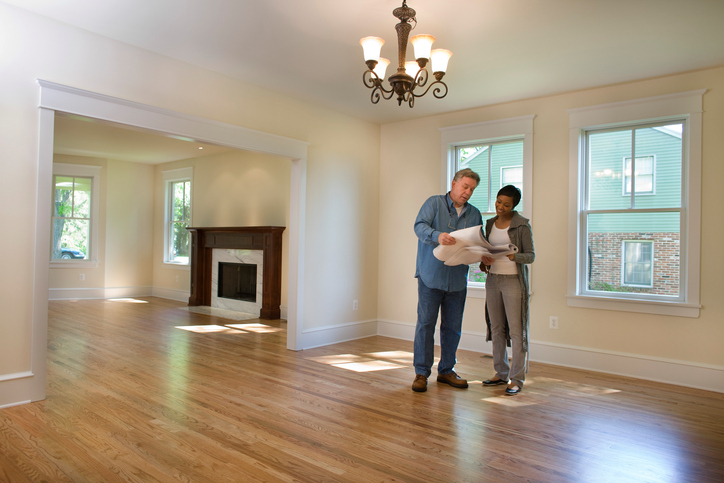Click here to Subscribe to Chips Tips Blog
Dreaming of Home Renovations? What You Need to Know About Building Permits

According to the Financial Post, Canadian homeowners are tackling remodeling projects in record numbers. BNN reports that, as of 2017, nearly half of all Canadian homeowners report that they plan to invest in home renovations this year!
When asked what their biggest remodel-related concerns are, these homeowners replied: project delays, spending too much, and the disruption to their regular home routines.
If you are planning a home remodel in the near future, you can probably relate to these concerns! You may also be worried about the permitting process itself. But Gravenhurst Plumbing, Heating & Electric can help you! Read on to learn the basics of applying for a building permit and how that process works.
The Hazards of Renovating Without a Permit
While this is not advisable, it is also not uncommon to find homeowners opting to complete small renovation projects without going through the building permit process.
There are four main areas where this strategy can backfire:
-
It can put you in a precarious negotiating position when you want to sell your home. Buyers are often reluctant to take on the responsibility of buying a home that includes unpermitted renovations.
-
If you are turned in, the Ministry of Municipal Affairs or your local municipality can shut down your renovation at any point until you obtain the required permits.
-
You may also have to redo part or all of the work already done to date if it was not done to your municipality's building code specifications.
-
If you work with a contractor and experience project delays or problems with the finished product, you will have little legal recourse without revealing the lack of required permits.
For these reasons and others, it is always best to go through the proper channels to get your building permit before starting a remodel project.
When You Need a Building Permit
According to the Ministry of Municipal Affairs and Housing for Ontario, you are required to apply for a permit under these conditions:
-
If you plan to repair or renovate an existing structure.
-
If you plan to add to an existing structure to expand it.
-
If you plan to add a structure (such as a mobile home or a building).
-
If you plan to construct any new building that measures over 10 meters.
-
If you plan to excavate an existing foundation or build a new foundation.
-
If you plan to build a seasonal structure.
-
If you plan to alter, repair, extend or install a sewage system on your property.
If you are ever uncertain whether a proposed repair or remodel project requires a building project, it is always a good idea to ask your municipality.
How to Apply for a Building Permit
In most cases, you can have your permit in-hand in a relatively short amount of time. The average is 10 to 30 days after you submit your application, depending on the type and complexity of your project.
This is the basic process for applying for a building permit:
-
Request a permit application with the appropriate municipal office.
-
Fill out the application completely and add in all requested documentation.
-
Have your building plans reviewed and approved by an entity with a BCIN (Building Code Identification Number) such as Gravenhurst Plumbing, Heating & Electric.
-
Pay the filing fee at the time you submit your application.
-
Wait for your application to be reviewed.
-
Receive an approval.
-
Post your building permit approval notice in a window or other area of high visibility on your property and make sure to keep a copy of your plans on the premises.
-
Work with building inspectors at each major phase of your project to ensure compliance with your municipality's building code and your building plans.
-
Complete construction.
While this process probably sounds simple enough, there is one possible hitch that may arise. If you submit your initial building plans for permitting and your application is denied, you will have to decide whether to proceed forward and file an appeal.
The most common reasons why a permit application may be denied include these:
-
Your building plans are not complete at the time of submission (for instance, if you plan to demolish part or all of a structure and then remodel or construct a new one, which may require two separate permit applications).
-
The plans were not reviewed and approved by an entity with a BCIN license.
-
The plans contravene your municipality's building code or property use code in some way.
-
If you wish to change the use of your property in a way that is outside current zoning standards in your municipality.
If you decide to appeal, get an attorney familiar with building permit issues involved.
Your Building Permit Is Approved—Now What?
Once your building permit is approved and issued, you are free to begin construction according to the construction timeline you submitted during the application process.
If you alter any part of your building plans during the construction phase, you must first notify the municipality that issued your building permit before proceeding.
As you complete each phase, you must also notify the permitting municipality to send out a building permit inspector to review work-to-date. Once you notify the municipality, the inspector has five days to do the inspection. During this time, you may not do any further work on your project.
Give Us a Call for Help With Building Permits
Here at Gravenhurst Plumbing, we are very familiar with the intricacies of building permits, municipal codes, technical requirements, and zoning rules and regulations. We hold a BCIN (Building Code Identification Number), which means we are licensed to review and approve your building plans.
If you are planning a building project, we can help streamline the process for you. Give us a call at 705-687-3402 or 877-885-3403 (Canada only).

